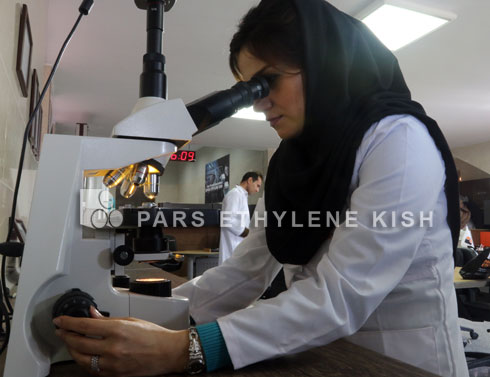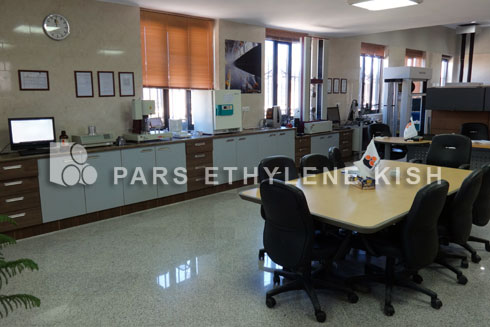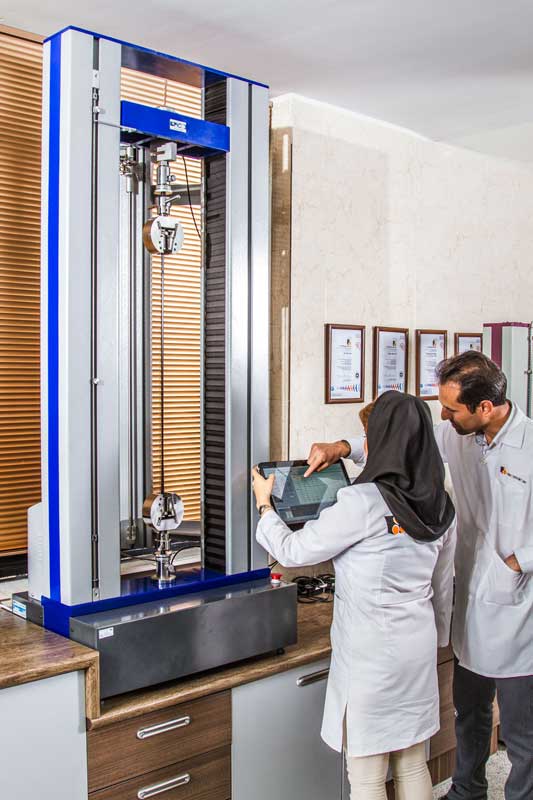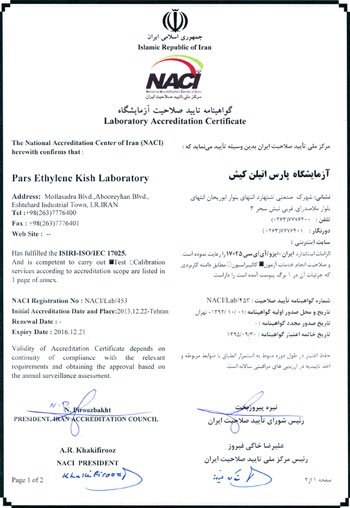
Polyethylene pipe quality control
QC of HDPE Pipe
Pars Ethylene Kish is a manufacturer of all types of pipes and fittings with a quality control lab equipped with advanced laboratory equipment. By doing precise testing on its products, this company has managed to introduce high quality products on the basis of internal and external standards. This laboratory delivers its services in accordance with ISO / IEC 17025 international standard by working on the dynamics, maintenance and improvement of the effectiveness of the activities, continuous improvement and customer satisfaction.
The tests are based on DIN 16961-ISIRI 9116-EN 13476-ISIRI 18781 - INSO 14427-DIN 8074 standards.
In this company, the tests are conducted as follows:
1. Density according to ISIRI 7175-5 standard
Physical properties of polyethylene can be predicted based on its density with good approximation. For this purpose, this test is carried out in this company by flotation on raw materials and products.
2. Melt flow index ISIRI 6980 standard
This test is a method for measuring the mass melt flow rate of soft heat substances under specified temperature conditions and in grams per ten minutes.
3. Long-term cyclic resistance according to DIN 16961 standard
The long-term cyclic strength of the pipe determines the life of a pipe against external pressures imposed on it.
4. Short-term cyclic resistance according to ISO 9969 standard
This test is a method for measuring the cyclic resistance of pipes.
5. Cyclic flexibility according to EN 1446
When the pipe is pressurized, under a particular tension, the deformation is elastic and it returns to its original shape by reducing the pipe tension. In this test, the pipe is pressurized to be curved to the extent of 30% its diameter. After removal of the force, the pipe must return to its original state and there should be no permanent movement and fracture in the pipe.
6. Measuring soot content according to ISIRI 7175-2 standard
The color of the pipe is effective on the long-term stability of the pipe against wind and sun, the soot that is added to blacken the polyethylene produces a good stability against ultraviolet radiation. This test controls the amount of soot of the raw material and the product.
7. Soot dispersion according to ISIRI 7175-6 standard
The precise and fine distribution of soot in polyethylene is important for achieving the desired functional properties, while the proper distribution of soot is very effective in the smoothness of the surface of pipe. This test examines the distribution and dispersion of soot.
8. Thermal return according to ISIRI 7175-3 standard
In this method, a certain length of the pipe is heated to 110 ° C. After the heating stage, the pipe surfaces are examined for defects such as gap, blister or wall separation.
9. Dimensional control according to DIN 16961-ISIRI 9116 standard
With this control, the inside diameter, the thickness of the inner wall and the height of the production profiles are examined.
10. Weld line elongation according to EN1979
This test measures the tensile strength of weld line of the spiral pipes by using tensile test machine. The spiral pipe must withstand the minimum tensile force required for the weld line.
11. Sealing
In this test, the water pressure of 0.5 bar is applied to the pipe for one minute, and no leakage should be allowed.
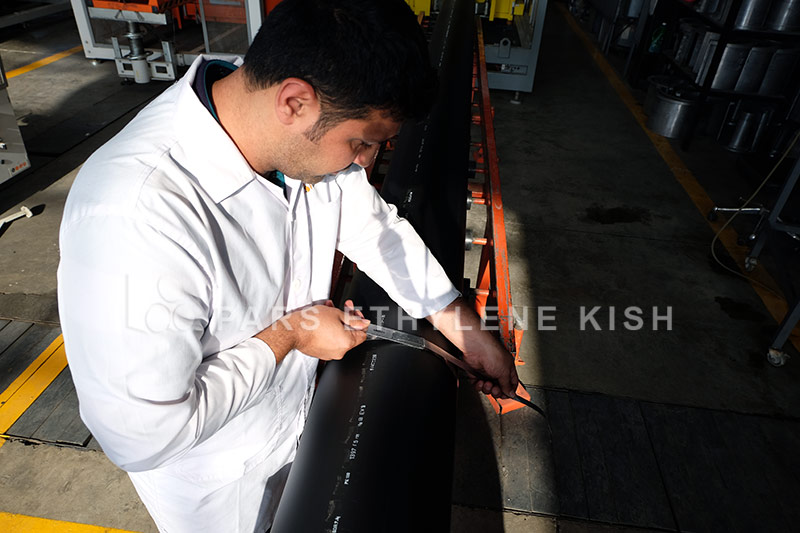
The most important tests performed on these pipes are:
-
The weight percentage of soot or carbon in polyethylene
-
Density determination
-
Flexural, pressure and elasticity coefficient tests
-
Pipe tolerance threshold tests against internal pressure
-
Tests of pipes’ physical properties (Dimensions - Diameter - Color)
-
Cyclic strength of pipe
-
Oxidation of pipes (thermal stability)
-
Polyethylene Viscosity
-
Hydrostatic Testing
Polyethylene pipes should record desired results in all of these tests; the least defect in the final result of the quality control test for polyethylene pipe means poor pipe quality and defect in the production line. For example, if the soot or carbon is not distributed uniformly throughout the pipe, the different parts of the pipe will have different strengths; therefore, some sections of the pipe wall will be much more fragile than the other parts.
The thermal stability test indicates the extent to which polyethylene pipes can withstand high temperatures; this is important for pipes that are supposed to be installed in very hot working conditions.
The Polyethylene Pipe Laboratory Management (polyethylene pipe quality control unit) is committed to provide the resources and facilities needed to meet the objectives and takes appropriate measures to meet the requirements of ISO / IEC 17025 standards and continuously improve their operations, and expects the organization's CEO to provide comprehensive support for achieving this policy, realizing the goals, and implementing the precise and effective quality management system of the laboratory. All personnel are committed to familiarize themselves with the quality system of the laboratory and they are required to adhere to its principles. By trusting in the Almighty God and commitment we can take an effective step in improving the quality of the pipe industry and the polyethylene fittings of our beloved country.
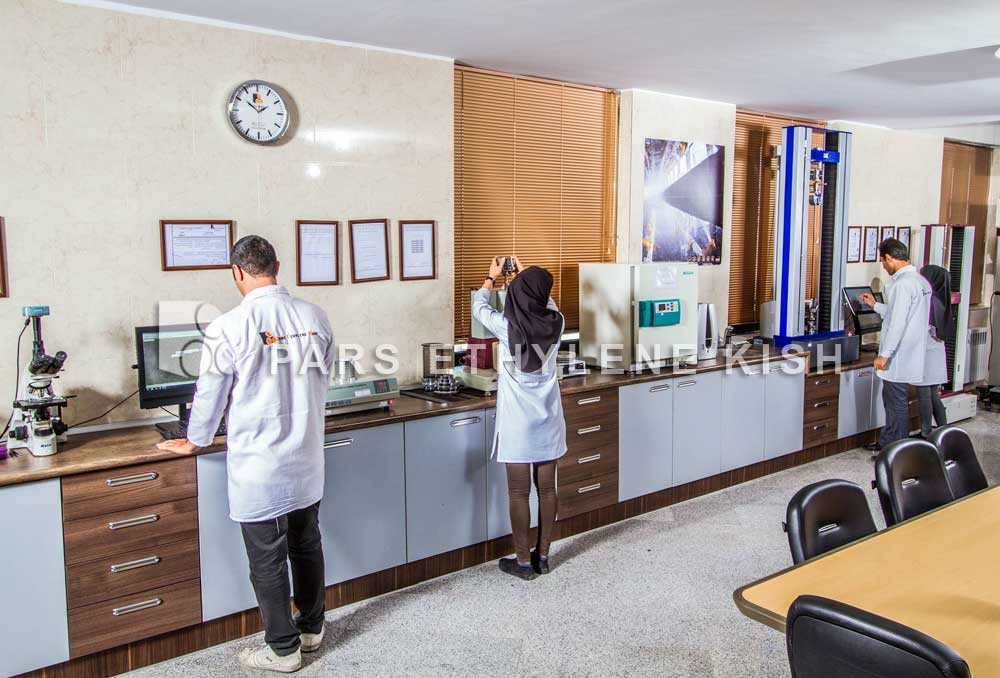
The measuring equipment of this laboratory includes the following items:
-
Pyrolysis machine to determine the weight percentage of soot in the mixture or pipe
-
plastometer machine to determine the polymer melt flow index (MFI)
-
Oven device for determining heat recovery
-
Scale with a precision of 0.0001 g for determining the density
-
DSC device to determine thermal stability
-
Microscope to check how soot is dispersed
-
Caliper and peripheral strips to measure the dimensions of the pipe
-
Tensile Testing Machine for testing the tensile strength of the pipe
-
Electrical furnace for pyrolysis
-
Differential Scanning Calorimeter (DSC)
-
Plastometer (MFR indexer)
-
Digital balance up to 300gr
-
Electrical oven
-
Tensile
-
Microscope
-
Digital caliper
-
Circumeter (Pi-meter)
-
Ultrasound thickness
-
Measuring device
-
Digital balance up to 30kg
-
Air thermometer and hygnometer (digital)
-
Meter
-
Chronometer
-
Generator and controller of internal hydrostatic pressure
Laboratory accessories:
This equipment are needed to test and evaluate the quality of HDPE pipes and can be used to evaluate the quality of raw materials and polyethylene pipes.
Quality Control Laboratory
17025 Certificates
Single wall polyethylene pipe laboratory
Corrugated Pipe Laboratory
Polyethylene pipe quality control
Polyethylene pipe inspection checklists
The Reason for High Quality of Pars Ethylene Kish Products
Reasons of paying attention to quality
Guaranty and after sales service
